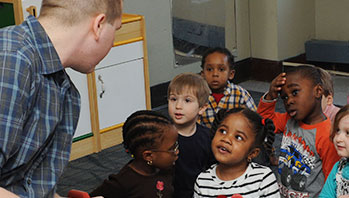- chart paper
- marker
- evaporate
- puddle
- wet
MA Standards:
Speaking and Listening/SL.PK.MA.1: Participate in collaborative conversations with diverse partners during daily routines and play.
Language/L.PK.MA.6: Use words and phrases acquired through conversations, listening to books read aloud, activities, and play.
Head Start Outcomes:
Language Development/Receptive Language: Attends to language during conversations, songs, stories, or other learning experiences.
Language Development/Expressive Language: Uses language to express ideas and needs.
Logic and Reasoning/Reasoning and Problem Solving: Classifies, compares, and contrasts objects, events, and experiences.
PreK Learning Guidelines:
English Language Arts/Language 2: Participate actively in discussions, listen to the ideas of others, and ask and answer relevant questions.
Talk Together: Where Does the Water Go?

© Commonwealth of Massachusetts, Department of Early Education and Care (Jennifer Waddell photographer). All rights reserved.
STEM Key Concepts: Wet things become dry as the water evaporates (changes from a liquid to a gas)
ELA Focus Skills: Listening and Speaking, Vocabulary
Introduce to children the science concept of evaporation. Begin the discussion by asking children questions to help them recall their first-hand experiences with the phenomenon of evaporation. For example, ask,
- Have you ever gone for a swim outside and then dried in the sun? What do you think happened to all the water that made you wet? Explain that the water evaporated.
- Have you ever played in a puddle after it rains? What had happened to the puddle the next time you went to play in it?
Encourage children to share their experiences with evaporation. Record their ideas on chart paper. Then tell children they are going to explore more to learn about where the water goes when things dry.
